PECL 欧洲合同法原则
- 格式:pdf
- 大小:307.36 KB
- 文档页数:41
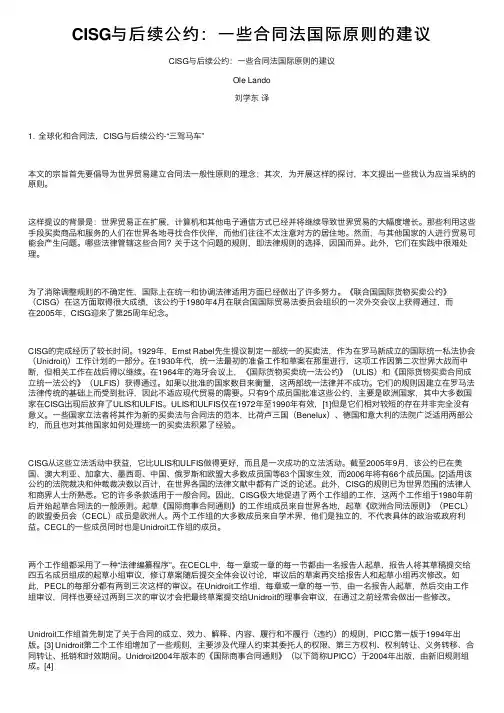
CISG与后续公约:⼀些合同法国际原则的建议CISG与后续公约:⼀些合同法国际原则的建议Ole Lando刘学东译1.全球化和合同法,CISG与后续公约-“三驾马车”本⽂的宗旨⾸先要倡导为世界贸易建⽴合同法⼀般性原则的理念;其次,为开展这样的探讨,本⽂提出⼀些我认为应当采纳的原则。
这样提议的背景是:世界贸易正在扩展,计算机和其他电⼦通信⽅式已经并将继续导致世界贸易的⼤幅度增长。
那些利⽤这些⼿段买卖商品和服务的⼈们在世界各地寻找合作伙伴,⽽他们往往不太注意对⽅的居住地。
然⽽,与其他国家的⼈进⾏贸易可能会产⽣问题。
哪些法律管辖这些合同?关于这个问题的规则,即法律规则的选择,因国⽽异。
此外,它们在实践中很难处理。
为了消除调整规则的不确定性,国际上在统⼀和协调法律适⽤⽅⾯已经做出了许多努⼒。
《联合国国际货物买卖公约》(CISG)在这⽅⾯取得很⼤成绩,该公约于1980年4⽉在联合国国际贸易法委员会组织的⼀次外交会议上获得通过,⽽在2005年,CISG迎来了第25周年纪念。
CISG的完成经历了较长时间。
1929年,Ernst Rabel先⽣提议制定⼀部统⼀的买卖法,作为在罗马新成⽴的国际统⼀私法协会(Unidroit))⼯作计划的⼀部分。
在1930年代,统⼀法最初的准备⼯作和草案在那⾥进⾏,这项⼯作因第⼆次世界⼤战⽽中断,但相关⼯作在战后得以继续。
在1964年的海⽛会议上,《国际货物买卖统⼀法公约》(ULIS)和《国际货物买卖合同成⽴统⼀法公约》(ULFIS)获得通过。
如果以批准的国家数⽬来衡量,这两部统⼀法律并不成功。
它们的规则因建⽴在罗马法法律传统的基础上⽽受到批评,因此不适应现代贸易的需要。
只有9个成员国批准这些公约,主要是欧洲国家,其中⼤多数国家在CISG出现后放弃了ULIS和ULFIS。
ULIS和ULFIS仅在1972年⾄1990年有效,[1]但是它们相对较短的存在并⾮完全没有意义。
⼀些国家⽴法者将其作为新的买卖法与合同法的范本,⽐荷卢三国(Benelux)、德国和意⼤利的法院⼴泛适⽤两部公约,⽽且也对其他国家如何处理统⼀的买卖法积累了经验。
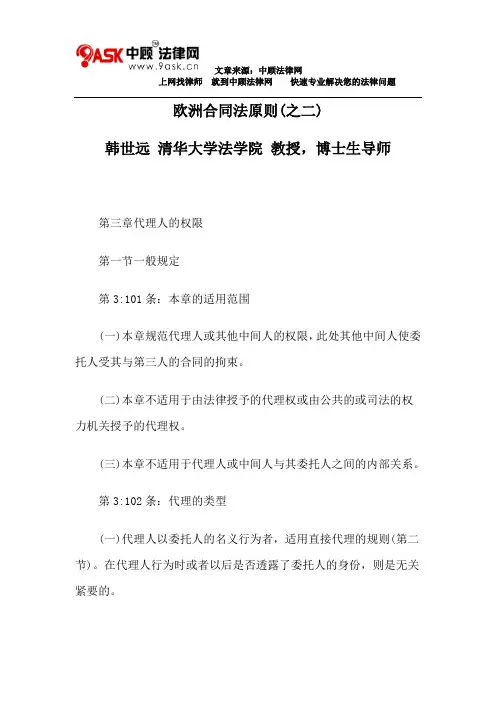
上网找律师就到中顾法律网快速专业解决您的法律问题欧洲合同法原则(之二)韩世远清华大学法学院教授,博士生导师第三章代理人的权限第一节一般规定第3:101条:本章的适用范围(一)本章规范代理人或其他中间人的权限,此处其他中间人使委托人受其与第三人的合同的拘束。
(二)本章不适用于由法律授予的代理权或由公共的或司法的权力机关授予的代理权。
(三)本章不适用于代理人或中间人与其委托人之间的内部关系。
第3:102条:代理的类型(一)代理人以委托人的名义行为者,适用直接代理的规则(第二节)。
在代理人行为时或者以后是否透露了委托人的身份,则是无关紧要的。
上网找律师就到中顾法律网快速专业解决您的法律问题(二)中间人依委托人的指令并为委托人的利益行事,但并非以委托人的名义者,或者第三人既不知道也没有理由应知道中间人系作为代理人而行为者,适用间接代理的规则(第三节)。
第二节直接代理第3:201条:明示的、默示的和表面的授权(一)委托人对以其名义行为的代理权的授予,可得为明示的,亦可得为由具体情事默示的。
(二)为实现授权目的,代理人有权依具体情事从事各种必要的行为。
(三)如果委托人的言语或行为导致第三人合理地且善意地相信代理人已被授权从事其所从事的行为,则视为委托人已经授权。
第3:202条:代理人对代理权的行使代理人在由第3:201条界定的授权的范围内行为,其行为直接拘束委托人和第三人。
代理人自己并不对第三人负有义务。
第3:203条:未被透露身份的委托人上网找律师就到中顾法律网快速专业解决您的法律问题如果代理人以委托人的名义缔结合同而委托人的身份要在日后透露,在经第三人要求后代理人没能在一段合理的时间内透露委托人的身份的,则代理人自己受合同的拘束。
第3:204条:代理人无权代理或越权代理(一)以代理人身份从事行为者如未经授权或超越了对它的授权范围,则其行为对委托人和第三人并无拘束力。
(二)如果未能依第3:207条而由委托人追认,代理人有责任向第三人支付损害赔偿,以使第三人处于如同代理人有权行为一样的状况。
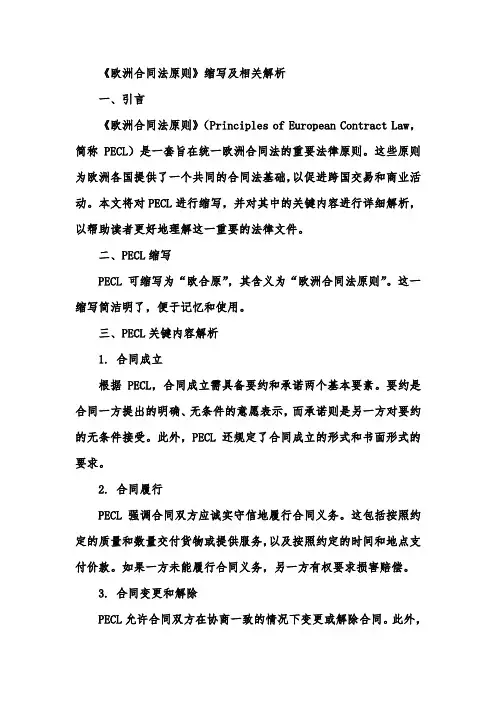
《欧洲合同法原则》缩写及相关解析一、引言《欧洲合同法原则》(Principles of European Contract Law,简称PECL)是一套旨在统一欧洲合同法的重要法律原则。
这些原则为欧洲各国提供了一个共同的合同法基础,以促进跨国交易和商业活动。
本文将对PECL进行缩写,并对其中的关键内容进行详细解析,以帮助读者更好地理解这一重要的法律文件。
二、PECL缩写PECL可缩写为“欧合原”,其含义为“欧洲合同法原则”。
这一缩写简洁明了,便于记忆和使用。
三、PECL关键内容解析1. 合同成立根据PECL,合同成立需具备要约和承诺两个基本要素。
要约是合同一方提出的明确、无条件的意愿表示,而承诺则是另一方对要约的无条件接受。
此外,PECL还规定了合同成立的形式和书面形式的要求。
2. 合同履行PECL强调合同双方应诚实守信地履行合同义务。
这包括按照约定的质量和数量交付货物或提供服务,以及按照约定的时间和地点支付价款。
如果一方未能履行合同义务,另一方有权要求损害赔偿。
3. 合同变更和解除PECL允许合同双方在协商一致的情况下变更或解除合同。
此外,如果出现法定或约定的事由,一方也可以单方面解除合同。
这些事由包括不可抗力、一方违约等。
4. 违约责任根据PECL,违约方应承担违约责任,包括实际损失和可得利益的损失。
如果违约是由于不可抗力或意外事件导致的,违约方可以免除责任。
此外,PECL还规定了违约金的适用和计算方法。
5. 争议解决PECL提倡通过协商、调解和仲裁等方式解决合同争议。
如果争议无法通过协商解决,双方可以向法院提起诉讼。
PECL还规定了诉讼时效和管辖权等问题。
四、结论本文对《欧洲合同法原则》进行了缩写和关键内容解析,帮助读者更好地理解这一重要的法律文件。
PECL为欧洲各国提供了一个共同的合同法基础,促进了跨国交易和商业活动的发展。
通过对PECL 的学习和了解,我们可以更好地运用法律知识指导实践,保障自身的合法权益。
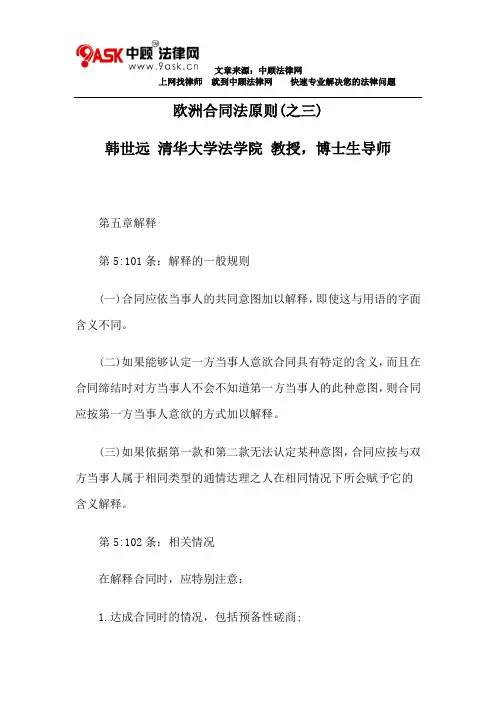
上网找律师就到中顾法律网快速专业解决您的法律问题欧洲合同法原则(之三)韩世远清华大学法学院教授,博士生导师第五章解释第5:101条:解释的一般规则(一)合同应依当事人的共同意图加以解释,即使这与用语的字面含义不同。
(二)如果能够认定一方当事人意欲合同具有特定的含义,而且在合同缔结时对方当事人不会不知道第一方当事人的此种意图,则合同应按第一方当事人意欲的方式加以解释。
(三)如果依据第一款和第二款无法认定某种意图,合同应按与双方当事人属于相同类型的通情达理之人在相同情况下所会赋予它的含义解释。
第5:102条:相关情况在解释合同时,应特别注意:1.达成合同时的情况,包括预备性磋商;上网找律师就到中顾法律网快速专业解决您的法律问题2.双方当事人的行为,即便是达成合同以后的行为;3.合同的性质与目的;4.由双方当事人以及它们内部确立的习惯做法对类似条款作出过的解释;5.在所涉行为的行业中条款或表述通常被赋予的含义,以及类似条款业已得到的解释;6.惯例;以及7.诚实信用和公平交易。
第5:103条:对使用者不利益规则对未经个别商议的合同条款存有疑义时,应作不利于使用该条款之当事人的解释。
第5:104条:经过商议的条款的优先性经过个别商议的条款优先于那些未经个别商议的条款。
第5:105条:合同作为整体的优先性条款应从它们表现出来的合同整体的角度加以解释。
上网找律师就到中顾法律网快速专业解决您的法律问题第5:106条:赋予条款完全的效力使合同条款合法或有效的解释方法优先于不具此种效果的解释方法。
第5:107条:语言的差异在合同采用两种或多种语言文本,其中没有一个被指定为权威文本时,如果不同文本之间存有差异,在解释上应以合同最初采用的文本优先。
第六章内容与效果第6:101条:产生合同债务的陈述(一)一方当事人于合同缔结前或合同缔结时所作的陈述将被视为一种合同性保证,只要那正是对方当事人在该具体情况下对它所合理地理解的,考虑:1.该陈述对于对方当事人的表面的重要性;2.该方当事人是否在经营过程中作出该陈述;以及3.当事人相关的专门技术。
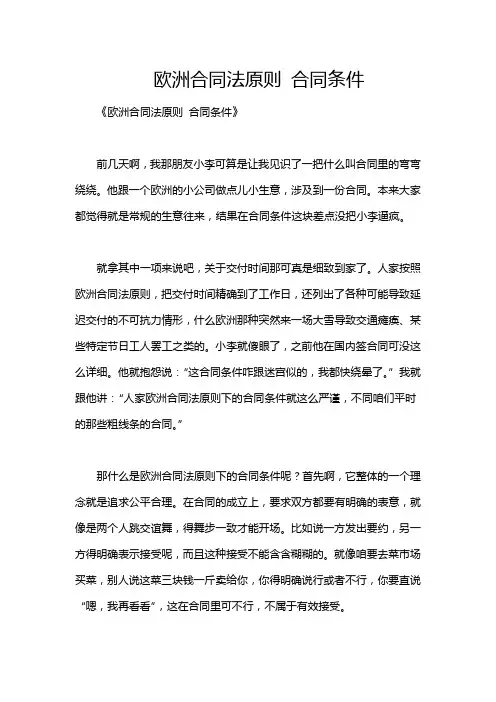
欧洲合同法原则合同条件《欧洲合同法原则合同条件》前几天啊,我那朋友小李可算是让我见识了一把什么叫合同里的弯弯绕绕。
他跟一个欧洲的小公司做点儿小生意,涉及到一份合同。
本来大家都觉得就是常规的生意往来,结果在合同条件这块差点没把小李逼疯。
就拿其中一项来说吧,关于交付时间那可真是细致到家了。
人家按照欧洲合同法原则,把交付时间精确到了工作日,还列出了各种可能导致延迟交付的不可抗力情形,什么欧洲那种突然来一场大雪导致交通瘫痪、某些特定节日工人罢工之类的。
小李就傻眼了,之前他在国内签合同可没这么详细。
他就抱怨说:“这合同条件咋跟迷宫似的,我都快绕晕了。
”我就跟他讲:“人家欧洲合同法原则下的合同条件就这么严谨,不同咱们平时的那些粗线条的合同。
”那什么是欧洲合同法原则下的合同条件呢?首先啊,它整体的一个理念就是追求公平合理。
在合同的成立上,要求双方都要有明确的表意,就像是两个人跳交谊舞,得舞步一致才能开场。
比如说一方发出要约,另一方得明确表示接受呢,而且这种接受不能含含糊糊的。
就像咱要去菜市场买菜,别人说这菜三块钱一斤卖给你,你得明确说行或者不行,你要直说“嗯,我再看看”,这在合同里可不行,不属于有效接受。
然后在合同的内容方面啊,真是跟绣花似的细致。
我再给你说说我那搞外贸的朋友小王的事儿。
他跟一个欧洲客户签合同,关于产品质量标准那一条,那叫一个啰嗦但又不得不说精确。
人家按照欧洲合同法原则,从产品该符合的行业基本标准,到产品可能涉及的环保指标,全写在合同条件里了。
小王当时就跟对方的代表打趣说:“你们这合同条件一写,我感觉这产品都被你们用放大镜看了一遍了。
”对方还一本正经地说:“这是为了避免不必要的纠纷,必须明确。
”也是,这要是像咱们平时说个大概齐,到时候出问题了可就扯不清楚了。
比如对于产品质量如何检测,人家都有明确的要求,用什么样的检测设备、由哪些机构检测,都规定得好好的。
如果检测出问题要怎么赔偿,是退款呢还是换货,换货的运输成本谁承担,能不能分批退换,这就好比是下棋,提前把可能的步数都考虑到了。
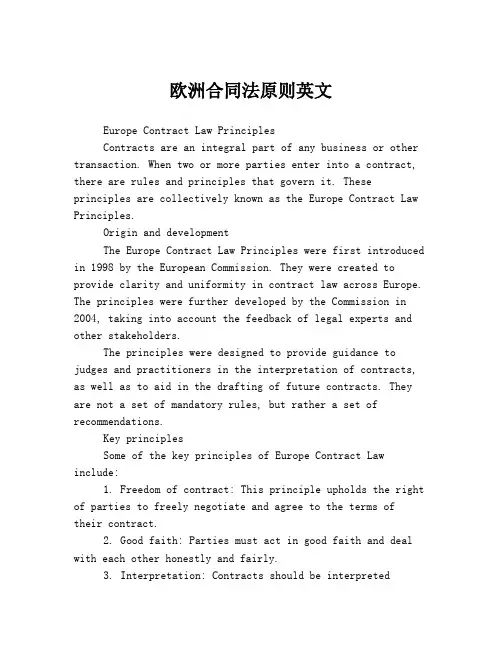
欧洲合同法原则英文Europe Contract Law PrinciplesContracts are an integral part of any business or other transaction. When two or more parties enter into a contract, there are rules and principles that govern it. These principles are collectively known as the Europe Contract Law Principles.Origin and developmentThe Europe Contract Law Principles were first introduced in 1998 by the European Commission. They were created to provide clarity and uniformity in contract law across Europe. The principles were further developed by the Commission in 2004, taking into account the feedback of legal experts and other stakeholders.The principles were designed to provide guidance to judges and practitioners in the interpretation of contracts, as well as to aid in the drafting of future contracts. They are not a set of mandatory rules, but rather a set of recommendations.Key principlesSome of the key principles of Europe Contract Law include:1. Freedom of contract: This principle upholds the right of parties to freely negotiate and agree to the terms oftheir contract.2. Good faith: Parties must act in good faith and deal with each other honestly and fairly.3. Interpretation: Contracts should be interpretedaccording to their true intention and purpose, taking into account the specific context in which they were made.4. Obligations of the parties: The obligations of the parties should be performed in good faith and with due care and attention.5. Remedies: In case of breach of contract, the innocent party is entitled to remedies such as damages, specific performance, or termination of the contract.6. Non-performance: If one party fails to perform its obligations, the other party may terminate the contract in certain circumstances.BenefitsThe Europe Contract Law Principles provide several benefits. They create a common framework for contract law across Europe, facilitating cross-border trade and investment. They also enhance legal certainty and predictability,reducing the risk of disputes and facilitating quicker resolution of any disputes that do arise.ConclusionContracts are an essential aspect of commerce andrequire careful attention and management. The Europe Contract Law Principles offer a guiding framework for businesses and legal practitioners to ensure that contracts are drafted and interpreted consistently and fairly. Understanding these principles is essential for any business that engages incross-border trade or investment within Europe.。
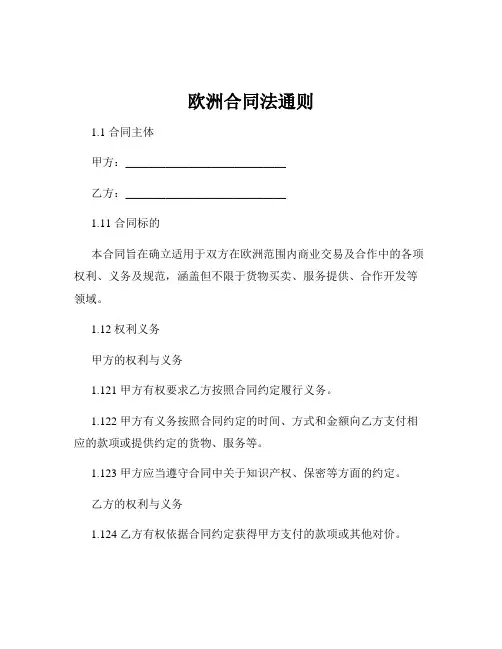
欧洲合同法通则1.1 合同主体甲方:____________________________乙方:____________________________1.11 合同标的本合同旨在确立适用于双方在欧洲范围内商业交易及合作中的各项权利、义务及规范,涵盖但不限于货物买卖、服务提供、合作开发等领域。
1.12 权利义务甲方的权利与义务1.121 甲方有权要求乙方按照合同约定履行义务。
1.122 甲方有义务按照合同约定的时间、方式和金额向乙方支付相应的款项或提供约定的货物、服务等。
1.123 甲方应当遵守合同中关于知识产权、保密等方面的约定。
乙方的权利与义务1.124 乙方有权依据合同约定获得甲方支付的款项或其他对价。
1.125 乙方有义务按照合同约定的质量、标准、时间和方式向甲方交付货物、提供服务或履行其他约定的义务。
1.126 乙方应当保证所提供的货物、服务等符合合同约定的质量标准,不存在任何瑕疵或缺陷。
1.13 违约责任若甲方违反本合同约定,如未按时支付款项、未提供约定的货物或服务等,应承担以下违约责任:1.131 向乙方支付逾期违约金,违约金的计算方式为未履行部分金额的[具体比例]%/日。
1.132 赔偿乙方因此所遭受的直接经济损失,包括但不限于乙方为履行合同而支出的费用、预期利益的损失等。
若乙方违反本合同约定,如未按时交付货物、提供的服务不符合约定标准等,应承担以下违约责任:1.133 采取补救措施,如重新交付货物、重新提供服务等,以达到合同约定的标准。
1.134 向甲方支付逾期违约金,违约金的计算方式为未履行部分金额的[具体比例]%/日。
1.135 赔偿甲方因此所遭受的直接经济损失,包括但不限于甲方因乙方违约而另行采购或寻求替代服务所支出的额外费用、业务损失等。
1.14 争议解决方式1.141 双方应首先通过友好协商解决因本合同引起的或与本合同有关的任何争议。
协商应在一方书面通知另一方争议事项后的[具体天数]天内开始。
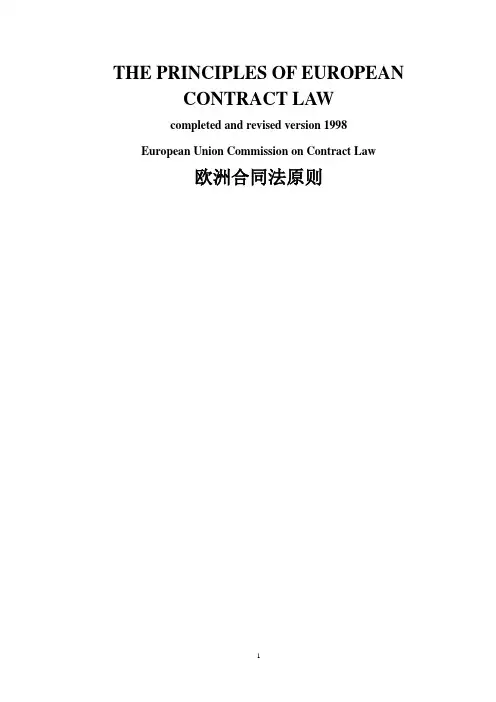
THE PRINCIPLES OF EUROPEAN CONTRACT LAWcompleted and revised version 1998European Union Commission on Contract Law欧洲合同法原则CHAPTER 1 - GENERAL PROVISIONS第一章一般规定Section 1 - Scope of the Principles第一节本原则的适用范围Article 1.101- Application of the Principles第1:101条:本原则的适用(1) These Principles are intended to be applied as general rules of contract law in the European Communities.(一)本原则拟作为合同法的一般规则在欧洲共同体适用。
(2) These Principles will apply when the parties have agreed to incorporate them into their contract or that their contract is to be governed by them.(二)如果当事人已约定将本原则订入其合同或者其合同受本原则的规制,本原则即予适用。
(3) These Principles may be applied when the parties: (a) have agreed that their contract is to be governed by ‘general principles of law’, the ‘lex mercatoria’ or the like; or (b) have not chosen any system or rules of law to govern their contract.(三)当事人于符合下列条件时,可适用本原则:1.约定其合同受“法的一般原则”、“商人法”或类似者之规制时;或者2.没有选择任何法律制度或者法律规则规制其合同。
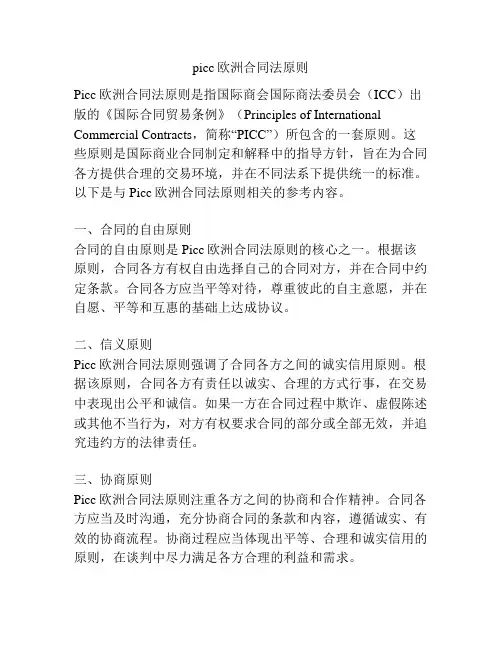
picc欧洲合同法原则Picc欧洲合同法原则是指国际商会国际商法委员会(ICC)出版的《国际合同贸易条例》(Principles of International Commercial Contracts,简称“PICC”)所包含的一套原则。
这些原则是国际商业合同制定和解释中的指导方针,旨在为合同各方提供合理的交易环境,并在不同法系下提供统一的标准。
以下是与Picc欧洲合同法原则相关的参考内容。
一、合同的自由原则合同的自由原则是Picc欧洲合同法原则的核心之一。
根据该原则,合同各方有权自由选择自己的合同对方,并在合同中约定条款。
合同各方应当平等对待,尊重彼此的自主意愿,并在自愿、平等和互惠的基础上达成协议。
二、信义原则Picc欧洲合同法原则强调了合同各方之间的诚实信用原则。
根据该原则,合同各方有责任以诚实、合理的方式行事,在交易中表现出公平和诚信。
如果一方在合同过程中欺诈、虚假陈述或其他不当行为,对方有权要求合同的部分或全部无效,并追究违约方的法律责任。
三、协商原则Picc欧洲合同法原则注重各方之间的协商和合作精神。
合同各方应当及时沟通,充分协商合同的条款和内容,遵循诚实、有效的协商流程。
协商过程应当体现出平等、合理和诚实信用的原则,在谈判中尽力满足各方合理的利益和需求。
四、合同的解释原则Picc欧洲合同法原则强调合同的明确和一致性。
各方应当将合同条款解释为可以合理预测,并应当尽量避免涉及不确定或模棱两可的词句。
在合同解释过程中,应当考虑各方的实际意图,并根据合同条款的语言和背景予以解释。
五、免责和责任原则Picc欧洲合同法原则对合同各方的免责和责任进行了规范。
根据该原则,当存在不可抗力或其他不可预测的事件导致合同无法履行时,受影响的合同方可以免于承担责任。
同时,合同各方应当以合理的方式履行其在合同中的责任,并对违约行为承担相应的赔偿责任。
六、合同的变更和终止原则Picc欧洲合同法原则对合同的变更和终止进行了规范。
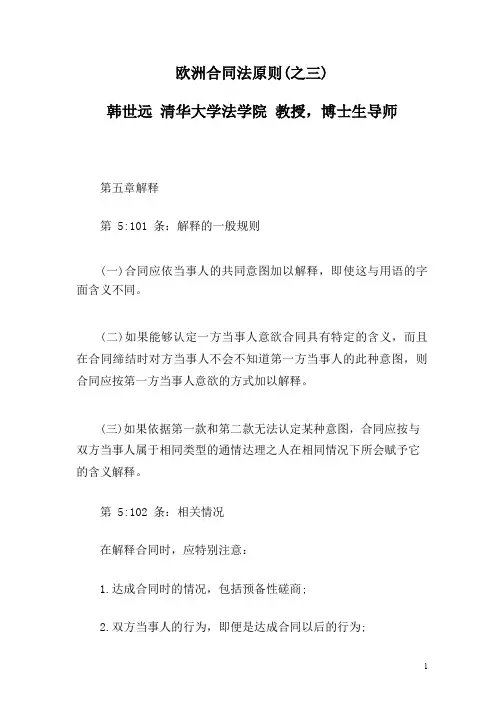
欧洲合同法原则(之三)韩世远清华大学法学院教授,博士生导师第五章解释第 5:101 条:解释的一般规则(一)合同应依当事人的共同意图加以解释,即使这与用语的字面含义不同。
(二)如果能够认定一方当事人意欲合同具有特定的含义,而且在合同缔结时对方当事人不会不知道第一方当事人的此种意图,则合同应按第一方当事人意欲的方式加以解释。
(三)如果依据第一款和第二款无法认定某种意图,合同应按与双方当事人属于相同类型的通情达理之人在相同情况下所会赋予它的含义解释。
第 5:102 条:相关情况在解释合同时,应特别注意:1.达成合同时的情况,包括预备性磋商;2.双方当事人的行为,即便是达成合同以后的行为;3.合同的性质与目的;4.由双方当事人以及它们内部确立的习惯做法对类似条款作出过的解释;5.在所涉行为的行业中条款或表述通常被赋予的含义,以及类似条款业已得到的解释;6.惯例;以及7.诚实信用和公平交易。
第 5:103 条:对使用者不利益规则对未经个别商议的合同条款存有疑义时,应作不利于使用该条款之当事人的解释。
第 5:104 条:经过商议的条款的优先性经过个别商议的条款优先于那些未经个别商议的条款。
第 5:105 条:合同作为整体的优先性条款应从它们表现出来的合同整体的角度加以解释。
第 5:106 条:赋予条款完全的效力使合同条款合法或有效的解释方法优先于不具此种效果的解释方法。
第 5:107 条:语言的差异在合同采用两种或多种语言文本,其中没有一个被指定为权威文本时,如果不同文本之间存有差异,在解释上应以合同最初采用的文本优先。
第六章内容与效果第 6:101 条:产生合同债务的陈述(一)一方当事人于合同缔结前或合同缔结时所作的陈述将被视为一种合同性保证,只要那正是对方当事人在该具体情况下对它所合理地理解的,考虑:1.该陈述对于对方当事人的表面的重要性;2.该方当事人是否在经营过程中作出该陈述;以及3.当事人相关的专门技术。
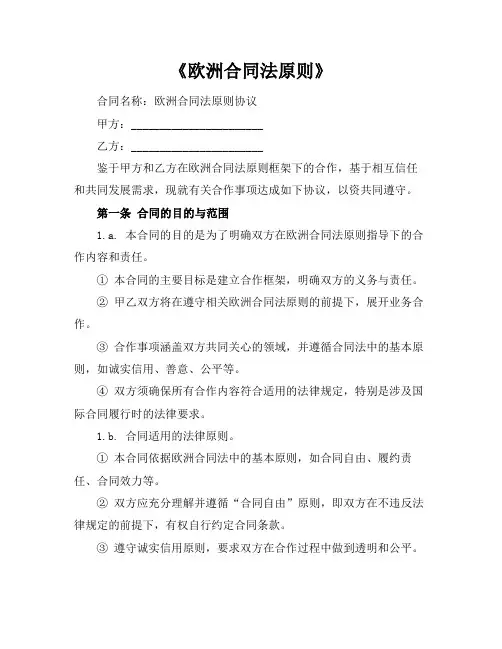
《欧洲合同法原则》合同名称:欧洲合同法原则协议甲方:_______________________乙方:_______________________鉴于甲方和乙方在欧洲合同法原则框架下的合作,基于相互信任和共同发展需求,现就有关合作事项达成如下协议,以资共同遵守。
第一条合同的目的与范围1.a. 本合同的目的是为了明确双方在欧洲合同法原则指导下的合作内容和责任。
① 本合同的主要目标是建立合作框架,明确双方的义务与责任。
② 甲乙双方将在遵守相关欧洲合同法原则的前提下,展开业务合作。
③ 合作事项涵盖双方共同关心的领域,并遵循合同法中的基本原则,如诚实信用、善意、公平等。
④ 双方须确保所有合作内容符合适用的法律规定,特别是涉及国际合同履行时的法律要求。
1.b. 合同适用的法律原则。
① 本合同依据欧洲合同法中的基本原则,如合同自由、履约责任、合同效力等。
② 双方应充分理解并遵循“合同自由”原则,即双方在不违反法律规定的前提下,有权自行约定合同条款。
③ 遵守诚实信用原则,要求双方在合作过程中做到透明和公平。
④ 对合同中的任何争议,双方承诺将通过协商解决,并遵循欧洲合同法相关仲裁条款。
1.c. 合作范围的具体界定。
① 双方约定的合作范围包括但不限于技术合作、市场开发、资金投入等方面。
② 合作中的技术与产品开发将严格按照双方事先约定的标准执行。
③ 任何一方不得在未征得另一方同意的情况下,将合作成果转让或出售给第三方。
④ 合作过程中涉及的知识产权归属应事先明确,以防止未来产生争议。
第二条双方的权利与义务2.a. 甲方的主要权利与义务。
① 甲方应根据合同约定,按时提供相关技术支持与资源。
② 甲方应向乙方提供合同履行过程中所需的必要信息和资料。
③ 甲方负责对所提供的产品和服务的质量进行保证。
④ 甲方应定期向乙方报告项目进展,并参与相关的质量监督与验收工作。
2.b. 乙方的主要权利与义务。
① 乙方应按时履行合同支付义务,确保合同中的资金需求得到满足。
picc欧洲合同法原则PICC(Principles of International Commercial Contracts,国际商事合同法原则)是由国际贸易法委员会(UNIDROIT)制定的一套非正式的合同法律原则,旨在为国际商事合同提供指导和解决争议的依据。
PICC的适用范围包括国际商事合同的订立、履行、内容解释、履行方式和不履行的后果等方面。
该原则主要以交易各方良好信用原则和公平原则为基础,强调积极履行合同义务和尊重当事人的合理期望。
PICC欧洲合同法原则是UNIDROIT PICC在欧洲地区的具体应用和解释。
这些原则在欧洲国家的法院和仲裁界得到广泛接受,并通过其在诸多国际商事争议中的应用而得到验证。
PICC欧洲合同法原则主要包括以下几个方面:1. 良好信用原则:要求交易各方诚实守信,确保诚信交易。
2. 约定自由原则:保护当事人对于合同内容的自主决定权。
3. 统一原则:在面对争议时,法院和仲裁机构应根据合同的整体性和公平原则来解释和完善合同条款。
4. 诚实信用原则:要求当事人不得利用合同条款或行为损害对方的利益,应以诚实、公正和讲求实效的方式履行合同。
5. 合理期望原则:根据交易各方之间的合理期望,解释和补充合同条款。
6. 履行方式原则:要求当事人按照合同约定的方式履行合同义务。
7. 不履行后果原则:规定当事人因不履行合同义务而承担的赔偿责任和违约责任。
这些原则为国际商事合同提供了一个相对统一和可预见的司法解释框架,在国际贸易中起到重要的指导作用。
尽管PICC欧洲合同法原则并非具有强制力的法律规则,但它们在解决国际商事争议中被广泛应用,以便协调不同国家法律制度之间的差异。
论间接代理委托人介入权的行使摘要:我国《合同法》第403条第1款关于委托人介入权的权利范围、行使条件和例外的规定比较粗糙。
以比较法为视角特别是借鉴英美法系的经验。
委托人行使介入权的条件是,由于丧失偿债能力或由于第三方原因致使不能向委托人履行义务或不完全履行义务。
为避免委托人滥用介入权,委托人只能行使代理人代表本人从第三方取得的权利。
此外,如果介入权的行使与代理人与第三方所订契约中的明示或默示条款相抵触,或者严重损害第三方利益的其他情形时,委托人不得行使介入权。
关键词:间接代理;委托人介入权;介入权行使间接代理制度下,委托人(本人、被代理人)享有介入权,即在特定条件下,本人取代受托人(代理人)之法律地位,介入到原本是受托人与第三人的合同关系中。
我国《合同法》第403条第1款对委托人介入权适用条件及适用之例外情形作了规定,但内容过于粗糙。
随着间接代理实践的不断增多,其不足逐渐显现。
考虑到合同法中间接代理制度较多地借鉴了英美法系不披露本人代理制度的理念,本文拟通过对英美法系中有关立法与判例的论述评析,以完善我国《合同法》403条第1款中委托人介入权行使之规定。
所谓间接代理委托人介入权,是指在间接代理中,代理人对第三人披露委托人,委托人因此取得代理人之法律地位,直接对第三人行使权利的能力。
代理人与第三人为商事交易之时,其并未披露存有代理关系之事实,而且第三人对此也无从所知,该情形下,就代理人与第三人之间的合同而言,无论从形式要件还是实质要件的角度,其成立与生效都是毋庸置疑的,基于合同关系的相对性,其法律效果应直接归属于合同当事人即代理人与第三人。
那么,法律何以冲破合同关系相对性这一最基本的合同法理,而赋予本人以介人权呢?在英美法系,本人介入权之法律形成以同一论为基础。
同一论是英美法系的代理制度得以建立的逻辑基础,同一论信奉“代理是委任的结果”的原则,不区分本人与代理人之间的内部关系,以及代理人与第三方的外部关系,只是简单的从一者引申出另一者,把代理权看作是直接源于本人与代理人之间的契约。
第1篇一、引言随着全球经济的日益一体化,跨国合同越来越多地成为国际商务活动的重要组成部分。
欧盟作为世界上最大的经济体之一,其合同法律适用规则对于跨国合同的法律纠纷解决具有重要意义。
本文旨在探讨欧盟合同法律适用的一般原则、具体规则以及面临的挑战。
二、欧盟合同法律适用的一般原则1. 自愿原则欧盟合同法律适用遵循自愿原则,即合同当事人可以根据自己的意愿选择适用的法律。
这一原则体现了合同自由的基本精神,符合市场经济的要求。
2. 合同法原则欧盟合同法律适用以合同法为依据,即合同当事人的权利和义务应遵循合同法的规定。
合同法旨在保护合同当事人的合法权益,维护市场秩序。
3. 法律确定性原则欧盟合同法律适用强调法律确定性,即合同当事人应知晓合同适用的法律,以便在发生争议时能够及时解决。
4. 公共秩序原则欧盟合同法律适用在特定情况下,可适用公共秩序原则,即当合同内容违反欧盟法律的基本原则或公共秩序时,合同可被认定为无效。
三、欧盟合同法律适用的具体规则1. 欧盟合同法基本规则(1)罗马公约:欧盟合同法的基本规则源于1957年签订的《罗马公约》。
该公约规定了合同当事人的权利和义务,明确了合同适用的法律。
(2)罗马II号条例:2009年生效的《罗马II号条例》取代了《罗马公约》,进一步明确了合同适用的法律。
2. 合同当事人选择适用法律(1)明示选择:合同当事人可以在合同中明确约定适用某一国家的法律。
(2)默示选择:当合同当事人未明确约定适用法律时,根据合同的性质、标的、履行地等因素,可推断出合同当事人所期望适用的法律。
3. 确定合同适用法律(1)合同性质:根据合同的性质确定适用的法律。
(2)标的物所在地:当合同标的物位于某一国家时,可推断出合同当事人所期望适用的法律。
(3)履行地:合同履行地所在国家的法律可作为合同适用的法律。
四、欧盟合同法律适用面临的挑战1. 法律适用争议由于合同当事人对合同适用的法律存在争议,可能导致合同纠纷的长期悬而未决。
欧洲合同法原则(韩世远译)第一章一般规定第一节本原则的适用范围第1:101条:本原则的适用(一)本原则拟作为合同法的一般规则在欧洲共同体适用。
(二)如果当事人已约定将本原则订入其合同或者其合同受本原则的规制,本原则即予适用。
(三)当事人于符合下列条件时,可适用本原则:1.约定其合同受“法的一般原则”、“商人法”或类似者之规制时;或者2.没有选择任何法律制度或者法律规则规制其合同。
(四)当可得适用的法律制度或者法律规则对所产生的问题没有提供一种解决方案时,本原则得作为一种解决方案。
第1:102条:合同自由(一)当事人可以自由缔结合同并决定其内容,但要符合诚实信用和公平交易,以及由本原则确立的强制性规则。
(二)当事人可以排除本原则的适用或者背离或变更其效力,除非本原则另有规定。
第1:103条:强行法(一)在其他可得适用的法律亦允许之场合,当事人可以选择使其合同受本原则的规制,以使国内的强制性规则不能适用。
(二)依据有关国际私法规则,如国内的、超国家的以及国际的强制性规则能够适用时,则应赋予这些强制性规则以效力,而不管规制该合同的法律。
第1:104条:对同意之问题的适用(一)当事人对适用本原则的合意,其存在及生效应依本原则加以确定。
(二)然一方当事人可以依据它的惯常居所所在国的法律来证明它不同意,只要情况表明依据本原则确定它的行为的效力将会是不合理的。
第1:105条:惯例与习惯做法(一)当事人受它们同意的惯例以及它们之间确立的习惯做法的拘束。
(二)与当事人处于同样情形下的其他人通常会认为可得适用的惯例,当事人受其拘束,除非适用该惯例会是不合理的。
第1:106条:解释与补充(一)本原则应本其目的予以解释和发展,特别是,应注意有必要促进诚实信用和公平交易、合同关系的确定性和适用的统一性。
(二)对属于本原则范围之内但又未为本原则明确解决的问题,应尽可能地依照本原则所隐含的精神予以解决。
如仍不能解决,则应适用依国际私法规则可以适用的法律制度。
pecl欧洲合同法PECL(欧洲私法原则)是欧洲合同法体系的一部分,是在欧洲法系国家中制定的一项基础性法律原则。
PECL的目的是通过确立基本的合同法原则来促进欧洲内部市场的统一和发展。
本文将分析PECL的主要内容和应用情况,并探讨其对欧洲合同法的影响。
PECL的主要内容包括合同的成立、履行和解释,以及合同的效力和履行中的缺陷。
在合同的成立方面,PECL规定了合同要素的要求,例如双方意思表示的一致性、合同标的的明确性和合法性等。
此外,PECL还规定了合同中当事人的义务和责任,包括信息披露、诚实信用原则和保密义务等。
在合同的履行方面,PECL明确了合同的约束力和效力。
根据PECL 的规定,当事人应按照合同的约定履行合同义务,并对不履行或违约行为承担相应的法律责任。
此外,PECL还规定了特殊情况下的履行方式,如不可抗力和临时不履行等。
在合同的解释方面,PECL强调了合同解释的客观原则和合理解释原则。
根据这些原则,合同的解释应考虑当事人的真实意图以及合同条款的语言和背景。
对于解释不明确或存在争议的合同条款,PECL还规定了补充规则,如合同解释以双方诚信和合理期望为基础等。
至于合同的效力和履行中的缺陷,PECL规定了撤销、修改和解除合同的条件和程序。
根据PECL的规定,当事人可以通过协商一致、法院判决或仲裁来解除合同。
此外,PECL还规定了合同中常见的缺陷,如误导和不当影响等,并规定了相应的救济措施。
PECL作为一项基础性法律原则,对欧洲合同法产生了广泛的影响。
许多欧洲国家将PECL的规定纳入本国法律体系,从而使其成为国内合同法的重要依据。
此外,PECL还为欧洲内部市场的发展提供了法律保障,促进了跨境交易和投资的增加。
然而,尽管PECL在欧洲范围内具有重要地位,但其对于欧洲合同法的统一程度仍然有限。
由于欧洲各国法律制度的差异和语言障碍等原因,PECL在实际应用中存在一定的问题和难度。
因此,进一步加强欧洲内部合同法的协调和标准化仍然是一个重要的课题。
欧洲合同法原则欧洲合同法原则是指欧洲各国在合同法方面达成的共识性原则。
这些原则贯穿于欧洲的法律体系,对于那些跨境合同发生纠纷的案件来说,这些原则也扮演着至关重要的角色。
1. 诚信原则欧洲合同法原则中最为重要的一个原则就是诚信原则。
诚信原则体现着相互信任和好意。
在合同的订立和履行过程中,各方应该遵循诚信原则,根据真诚的信仰而行事,以达成公正和平衡的交易结果。
2. 自由原则自由原则也是一个非常重要的原则。
该原则鼓励各方在合同订立过程中实现经济自由,并在充分的知情情况下作出自主的选择。
自由原则的核心是合意原则即双方自由地协商订立合同。
在自由原则下,合同的订立和履行都应基于当事人的自愿和自由,不得利用欺诈、压迫等方式获得明显有失公序良俗的合同。
3. 公正原则公正原则要求合同中的条款和条件应当公平合理,并且各方之间应当建立和保持公正的关系。
在合同的建立和解决争议的过程中,公正原则非常重要,因为它保障了各方的权利和利益。
4. 识别和知情原则识别和知情原则是基于合同双方的行为应当是理性和对现实情况充分认识的基础上进行。
该原则要求合同中的各项条款必须非常明确,便于各方理解、接受、履行。
同时还要在合同订立或履行过程中提供明确、充分的信息。
例如,双方应清楚合同的内容,特别是隐藏的条件,以保证在签署合同之前,各自都具备了充分的了解。
5. 相互信赖原则合同的履行离不开合同双方之间的相互信赖。
相互信赖原则强调各方之间要建立信任和依赖的关系,因此既解决商业交易中的冲突和纠纷,也提高了商业交易的效率。
欧洲合同法原则对于跨境合同的解决具有指导意义,它规范了各国商务交往中的合同行为,在国际贸易中占据了重要地位。
总之,欧洲合同法原则的制定能够为欧洲各国的商业交往提供一定的法律保障,从而促进跨境贸易的发展。
The Principles Of European Contract Law1998,Parts I and II-(Parts I and II completed and revised)European Unioncopy@Copyright©1998European UnionContentsTHE PRINCIPLES OF EUROPEAN CONTRACT LA W-completed and revised version19981 CHAPTER1-GENERAL PROVISIONS1 Section1-Scope of the Principles1 Article1.101(ex art.1.101)-Application of the Principles (1)Article1.102-Freedom of contract (1)Article1.103-Mandatory Law (1)Article1.104-Application to questions of consent (2)Article1.105(ex art.1.103)-Usages and Practices (2)Article1.106(ex art.1.104)-Interpretation and Supplementation (2)Article1.107(ex Art.1.113)-Application of the Principles by Way of Analogy2 Section2-General Obligations2 Article1.201(ex art.1.106)-Good Faith and Fair Dealing (2)Article1.202(ex art.1.107)-Duty to Co-operate (3)Section3-Terminology and Other Provisions3 Article1.301(ex art.1.105)-Meaning of Terms (3)Article1.302(ex art.1.108)-Reasonableness (3)Article1.303(ex art.1.110)-Notice (3)Article1.304(ex art.1.111)-Computation of Time (4)Article1.305(ex art.1.109)-Imputed Knowledge and Intention (4)CHAPTER2-FORMATION5 Section1-General Provisions5 Article2.101(ex art.5.101)-Conditions for the Conclusion of a Contract..5 Article2.102(ex art.5.102)-Intention (5)Article2.103(ex art.5.103)-Sufficient Agreement (5)Article2.104(ex art.5.103A)-Terms not individually negotiated (5)Article2.105(ex art.5.106A)-Merger Clause (6)Article2.106(ex art.5.106B)-Written Modification only (6)Article2.107(ex art.5.108)-Promises binding without acceptance (6)Section2-Offer and Acceptance6 Article2.201(ex art.5.201)-Offer (6)Article2.202(ex art.5.202)-Revocation of an Offer (7)Article2.203(ex art.5.203)-Lapse of an Offer (7)Article2.204(ex art.5.204)-Acceptance (7)Article2.205(ex art.5.205)-Time of Conclusion of the Contract (7)Article2.206(ex art.5.206)-Time Limit for Acceptance (7)Article2.207(ex art.5.208)-Late Acceptance (8)Article2.208(ex art.5.209)-Modified Acceptance (8)Article2.209(ex art.5.210)-Conflicting General conditions (8)Article2.210(ex art.5.211)-Professional's written confirmation (9)Article2.211(ex art.5.212)-Contracts not Concluded through Offer and Ac-ceptance (9)Section3-Liability for negotiations9 Article2.301(ex art.5.301)-Negotiations Contrary to Good Faith (9)Article2.302(ex art.5.302)-Breach of Confidentiality (9)CHAPTER3-AUTHORITY OF AGENTS10 Section1-General Provisions10 Article3.101-Scope of the Chapter (10)Article3.102-Categories of Representation (10)Section2-Direct Representation10 Article3.201-Express,implied and apparent authority (10)Article3.202-Agent acting in exercise of his authority (10)Article3.203-Unidentified Principal (11)Article3.204-Agent acting without or outside his authority (11)Article3.205-Conflict of Interests (11)Article3.206-Subagency (11)Article3.207-Ratification by Principal (11)Article3.208-Third Party's Right with Respect to Confirmation of Authority.12 Article3.209-Duration of Authority (12)Section3-Indirect Representation12 Article3.301-Intermediaries not acting in the name of a Principal (12)Article3.302-Intermediary's Insolvency or Fundamental Non-performance to Principal (13)Article3.303-Intermediary's Insolvency or Fundamental Non-performance to Third Party (13)Article3.304-Requirement of Notice (13)CHAPTER4-VALIDITY13 Article4.101(ex art.6.101)-Matters not Covered (13)Article4.102(ex art.6.102)-Initial Impossibility (13)Article4.103(ex art.6.103)-Mistake as to facts or law (14)Article4.104(ex art.6.104)-Inaccuracy in communication (14)Article4.105(ex art.6.105)-Adaptation of contract (14)Article4.106(ex art.6.106)-Incorrect information (15)Article4.107(ex art.6.107)-Fraud (15)Article4.108(ex art.6.108)-Threats (15)Article4.109(ex art.6.109)-Excessive benefit or unfair advantage (15)Article4.110(ex art. 6.110)-Unfair terms which have not been individually negotiated (16)Article4.111(ex art.6.111)-Third persons (16)Article4.112(ex art.6.112)-Notice of Avoidance (17)Article4.113(ex art.4.113)-Time limits (17)Article4.114(ex art.6.114)-Confirmation (17)Article4.115(ex art.6.116)-Effect of avoidance (17)Article4.116(ex art.6.115)-Partial avoidance (17)Article4.117(ex art.6.117)-Damages (18)Article4.118(ex.art.6.118)-Exclusion or restriction of remedies (18)Article4.119(ex art.6.119)-Remedies for non-performance (18)CHAPTER5-INTERPRETATION18 Article5.101(Ex art.7.101/101A)-General Rules of Interpretation (18)Article5.102(ex art.7.102)-Relevant Circumstances (19)Article5.103(ex art.7.103)-Contra Proferentem Rule (19)Article5.104(ex art.7.104)-Preference to Negotiated Terms (19)Article5.105(ex art.7.105)-Reference to Contract as a Whole (19)Article5.106(ex art.7.106)-Terms to Be Given(Full)Effect (19)Article5.107(ex art.7.107)-Linguistic Discrepancies (19)CHAPTER6-CONTENTS AND EFFECTS20 Article6.101(ex art.8.101)-Statements giving rise to contractual obligation20 Article6.102(replaces5.108)-Implied obligations (20)Article6.103-Simulation (20)Article6.104(ex art.2.101)-Determination of Price (20)Article6.105(ex art.2.102)-Unilateral Determination by a Party (21)Article6.106(ex art.2.103)-Determination by a Third Person (21)Article6.107(ex art.2.104)-Reference to a Non Existent Factor (21)Article6.108(ex art.2.105)-Quality of Performance (21)Article6.109(ex art.2.109)-Contract for an Indefinite Period (21)Article6.110(ex art.2.115)-Stipulation in Favour of a Third Party (21)Article6.111(ex art.2.117)-Change of Circumstances (22)CHAPTER7-PERFORMANCE22 Article7.101(ex art.2.106)-Place of Performance (22)Article7.102(ex art.2.107)-Time of Performance (23)Article7.103(ex art.2.108)-Early Performance (23)Article7.104-Order of performance (23)Article7.105-Alternative performance (23)Article7.106(ex art.2.116)-Performance by a Third Person (24)Article7.107(ex art.2.110)-Form of Payment (24)Article7.108(ex art.2.111)-Currency of Payment (24)Article7.109(ex art.2.112)-Appropriation of Performance (24)Article7.110(ex art.2.113)-Property Not Accepted (25)Article7.111(ex art.2.114)-Money not Accepted (25)Article7.112-Costs of performance (26)CHAPTER8-NON-PERFORMANCE AND REMEDIES IN GENERAL26 Article8.101(ex art.3.101)-Remedies Available (26)Article8.102(ex art.3.102)-Cumulation of Remedies (26)Article8.103(ex art.3.103)-Fundamental Non-Performance (26)Article8.104(ex art.3.104)-Cure by Non-Performing Party (26)Article8.105(ex art.3.105)-Assurance of Performance (27)Article8.106(ex art.3.106)-Notice Fixing Additional Period for Performance27 Article8.107(ex art.3.107)-Performance Entrusted to Another (27)Article8.108(ex art3.108)-Excuse Due to an Impediment (27)Article8.109(ex3.109)-Clause Limiting or Excluding Remedies (28)CHAPTER9-PARTICULAR REMEDIES FOR NON-PERFORMANCE28 Section1-Right to Performance28 Article9.101(ex art.4.101)-Monetary Obligations (28)Article9.102(ex art.4.102)-Non-monetary Obligations (28)Article9.103(ex art4.103)-Damages Not Precluded (29)Section2-Right To Withhold Performance29 Article9.201(ex art4.201)-Right to Withhold Performance (29)Section3-Termination Of The Contract29 Article9.301(ex art.4.301)-Right to Terminate the Contract (29)Article9.302(ex art4.302)-Contract to be Performed in Parts (29)Article9.303(ex art.4.303)-Notice of Termination (29)Article9.304(ex art.4.304)-Anticipatory Non-Performance (30)Article9.305(ex art.4.305)-Effects of Termination in General (30)Article9.306(ex art.4.306)-Property Reduced in Value (30)Article9.307(ex art.4.307)-Recovery of Money Paid (30)Article9.308(ex art4.308)-Recovery of Property (31)Article9.309(ex art.4.309)-Recovery for Performance that Cannot be Re-turned (31)Section4-Price Reduction31 Article9.401(ex art4.401)-Right to Reduce Price (31)Section5-Damages and Interest31 Article9.501(ex art.4.501)-Right to Damages (31)Article9.502(ex art4.502)-General Measure of Damages (32)Article9.503(ex art.4.503)-Foreseeability (32)Article9.504-Loss Attributable to Aggrieved Party(new;previously part of4.504) (32)Article9.505-Reduction of loss(previously part of4.504) (32)Article9.506(ex art.4.505)-Substitute Transaction (32)Article9.507(ex art.4.506)-Current Price (32)Article9.508(ex art.4.507)-Delay in Payment of Money (33)Article9.509(ex art.4.508)-Agreed Payment for Non-performance (33)Article9.510(ex art.4.509)-Currency by which Damages to be Measured.33 Metadata34 SiSU Metadata,document information (34)THE PRINCIPLES OF EUROPEAN CONTRACT LAW-completed1 and revised version1998CHAPTER1-GENERAL PROVISIONS2 Section1-Scope of the Principles3 Article1.101(ex art.1.101)-Application of the Principles4 (1)These Principles are intended to be applied as general rules of contract law in the5 European Communities.(2)These Principles will apply when the parties have agreed to incorporate them into6 their contract or that their contract is to be governed by them.(3)These Principles may be applied when the parties:7(a)have agreed that their contract is to be governed by“general principles of law”,the8“lex mercatoria”or the like;or(b)have not chosen any system or rules of law to govern their contract.9(4)These Principles may provide a solution to the issue raised where the system or10 rules of law applicable do not do so.Article1.102-Freedom of contract11 (1)Parties are free to enter into a contract and to determine its contents,subject to12 the requirements of good faith and fair dealing,and the mandatory rules established by these Principles.(2)The parties may exclude the application of any of the Principles or derogate from or13 vary their effects,except as otherwise provided by these Principles.Article1.103-Mandatory Law14 (1)Where the otherwise applicable law so allows,the parties may choose to have their15 contract governed by the Principles,with the effect that national mandatory rules are not applicable.(2)Effect should nevertheless be given to those mandatory rules of national,suprana-16 tional and international law which,according to the relevant rules of private international law,are applicable irrespective of the law governing the contract.Article1.104-Application to questions of consent17 (1)The existence and validity of the agreement of the parties to adopt or incorporate18 these Principles shall be determined by these Principles.(2)Nevertheless,a party may rely upon the law of the country in which it has its habitual19 residence to establish that it did not consent if it appears from the circumstances that it would not be reasonable to determine the effect of its conduct in accordance with these Principles.Article1.105(ex art.1.103)-Usages and Practices20 (1)The parties are bound by any usage to which they have agreed and by any practice21 they have established between themselves.(2)The parties are bound by a usage which would be considered generally applicable22 by persons in the same situation as the parties,except where the application of such usage would be unreasonable.Article1.106(ex art.1.104)-Interpretation and Supplementation23 (1)These Principles should be interpreted and developed in accordance with their pur-24 poses.In particular,regard should be had to the need to promote good faith and fair dealing,certainty in contractual relationships and uniformity of application.(2)Issues within the scope of these Principles but not expressly settled by them are25 so far as possible to be settled in accordance with the ideas underlying the Principles. Failing this,the legal system applicable by virtue of the rules of private international lawis to be applied.Article1.107(ex Art.1.113)-Application of the Principles by Way of26 AnalogyThese Principles apply with appropriate modifications to agreements to modify or end27 a contract,to unilateral promises and other statements and conduct indicating inten-tion.Section2-General Obligations28 Article1.201(ex art.1.106)-Good Faith and Fair Dealing29(1)Each party must act in accordance with good faith and fair dealing.30(2)The parties may not exclude or limit this duty.31Article1.202(ex art.1.107)-Duty to Co-operate32 Each party owes to the other a duty to co-operate in order to give full effect to the33 contract.Section3-Terminology and Other Provisions34 Article1.301(ex art.1.105)-Meaning of Terms35 In these Principles,except where the context otherwise requires:36(1)`act'includes omission;37(2)`court'includes arbitral tribunal;38(3)an`intentional'act includes an act done recklessly;39(4)`non-performance'denotes any failure to perform an obligation under the contract,40 whether or not excused,and includes delayed performance,defective performance and failure to co-operate in order to give full effect to the contract.(5)A matter is`material'if it is one which a reasonable person in the same situation as41 one party ought to have known would influence the other party in its decision whetherto contract on the proposed terms or to contract at all..(6)`Written'statements include communications made by telegram,telex,telefax and42 electronic mail and other means of communication capable of providing a readable record of the statement on both sidesArticle1.302(ex art.1.108)-Reasonableness43 Under these Principles reasonableness is to be judged by what persons acting in good44 faith and in the same situation as the parties would consider to be reasonable.In particular,in assessing what is reasonable the nature and purpose of the contract,the circumstances of the case,and the usages and practices of the trades or professions involved should be taken into account.Article1.303(ex art.1.110)-Notice45 (1)Any notice may be given by any means,whether in writing or otherwise,appropriate46 to the circumstances.(2)Subject to paragraphs(4)and(5),any notice becomes effective when it reaches the47 addressee.(3)A notice reaches the addressee when it is delivered to it or to its place of business48 or mailing address,or,if it does not have a place of business or mailing address,to its habitual residence(4)If one party gives notice to the other because of the other's non-performance or49 because such non-performance is reasonably anticipated by the first party,and the notice is properly dispatched or given,a delay or inaccuracy in the transmission of the notice or its failure to arrive does not prevent it from having effect.The notice shall have effect from the time at which it would have arrived in normal circumstances.(5)A notice has no effect if a withdrawal of it reaches the addressee before or at the50 same time as the notice.(6)In this Article,`notice'includes the communication of a promise,statement,offer,51 acceptance,demand,request or other declaration.Article1.304(ex art.1.111)-Computation of Time52 (1)A period of time set by a party in a written document for the addressee to reply or53 take other action begins to run from the date stated as the date of the document.If no date is shown,the period begins to run from the moment the document reaches the addressee.(2)Official holidays and official non-working days occurring during the period are in-54 cluded in calculating the period.However,if the last day of the period is an official holi-day or official non-working day at the address of the addressee,or at the place where a prescribed act is to be performed,the period is extended until the first following working day in that place.(3)Periods of time expressed in days,weeks,months or years shall begin at00.00on55 the next day and shall end at24.00on the last day of the period;but any reply that hasto reach the party who set the period must arrive,or other act which is to be done mustbe completed,by the normal close of business in the relevant place on the last day of the period.Article1.305(ex art.1.109)-Imputed Knowledge and Intention56 If any person who with a party's assent was involved in making a contract,or who was57 entrusted with performance by a party or performed with its assent:(a)knew or foresaw a fact,or ought to have known or foreseen it;or58(b)acted intentionally or with gross negligence,or not in accordance with good faith59 and fair dealing,this knowledge,foresight or behaviour is imputed to the party itself.60CHAPTER2-FORMATION61 Section1-General Provisions62 Article2.101(ex art.5.101)-Conditions for the Conclusion of a Contract63(1)A contract is concluded if:64(a)the parties intend to be legally bound,and65(b)they reach a sufficient agreement66 without any further requirement.67 (2)A contract need not be concluded or evidenced in writing nor is it subject to any68 other requirement as to form.The contract may be proved by any means,including witnesses.Article2.102(ex art.5.102)-Intention69 The intention of a party to be legally bound by contract is to be determined from70 the party's statements or conduct as they were reasonably understood by the other party.Article2.103(ex art.5.103)-Sufficient Agreement71(1)There is sufficient agreement if the terms:72(a)have been sufficiently defined by the parties so that the contract can be enforced,73 or(b)can be determined under these Principles.74(2)However,if one of the parties refuses to conclude a contract unless the parties have75 agreed on some specific matter,there is no contract unless agreement on that matter has been reached.Article2.104(ex art.5.103A)-Terms not individually negotiated76(1)Contract terms which have not been individually negotiated may be invoked against77a party who did not know of them only if the party invoking them took reasonable steps to bring them to the other party's attention before or when the contract was con-cluded.(2)Terms are not brought appropriately to a party's attention by a mere reference to78 them in a contract document,even if that party signs the document.Article2.105(ex art.5.106A)-Merger Clause79(1)If a written contract contains an individually negotiated clause stating that the writing80 embodies all the terms of the contract(a merger clause),any prior statements,under-takings or agreements which are not embodied in the writing do not form part of the contract.(2)If the merger clause is not individually negotiated it will only establish a presumption81 that the parties intended that their prior statements,undertakings or agreements were not to form part of the contract.This rule may not be excluded or restricted.(3)The parties'prior statements may be used to interpret the contract.This rule may82 not be excluded or restricted except by an individually negotiated clause.(4)A party may by its statements or conduct be precluded from asserting a merger83 clause to the extent that the other party has reasonably relied on them.Article2.106(ex art.5.106B)-Written Modification only84 (1)A clause in a written contract requiring any modification or ending by agreement to85 be made in writing establishes only a presumption that an agreement to modify or end the contract is not intended to be legally binding unless it is in writing.(2)A party may by its statements or conduct be precluded from asserting such a clause86 to the extent that the other party has reasonably relied on them.Article2.107(ex art.5.108)-Promises binding without acceptance87 A promise which is intended to be legally binding without acceptance is binding.88 Section2-Offer and Acceptance89 Article2.201(ex art.5.201)-Offer90(1)A proposal amounts to an offer if:91(a)it is intended to result in a contract if the other party accepts it,and92(b)it contains sufficiently definite terms to form a contract.93(2)An offer may be made to one or more specific persons or to the public.94(3)A proposal to supply goods or services at stated prices made by a professional95 supplier in a public advertisement or a catalogue,or by a display of goods,is presumedto be an offer to sell or supply at that price until the stock of goods,or the supplier's capacity to supply the service,is exhausted.Article2.202(ex art.5.202)-Revocation of an Offer96 (1)An offer may be revoked if the revocation reaches the offeree before it has dis-97 patched its acceptance or,in cases of acceptance by conduct,before the contract has been concluded under Article2.205(2)or(3).(2)An offer made to the public can be revoked by the same means as were used to98 make the offer.(3)However,a revocation of an offer is ineffective if:99(a)the offer indicates that it is irrevocable;or100(b)it states a fixed time for its acceptance;or101(c)it was reasonable for the offeree to rely on the offer as being irrevocable and the102 offeree has acted in reliance on the offer.Article2.203(ex art.5.203)-Lapse of an Offer103 When a rejection of an offer reaches the offeror,the offer lapses.104 Article2.204(ex art.5.204)-Acceptance105 (1)Any form of statement or conduct by the offeree is an acceptance if it indicates106 assent to the offer.(2)Silence or inactivity does not in itself amount to acceptance.107 Article2.205(ex art.5.205)-Time of Conclusion of the Contract108 (1)If an acceptance has been dispatched by the offeree the contract is concluded when109 the acceptance reaches the offeror.(2)In case of acceptance by conduct,the contract is concluded when notice of the110 conduct reaches the offeror.(3)If by virtue of the offer,of practices which the parties have established between111 themselves,or of a usage,the offeree may accept the offer by performing an act with-out notice to the offeror,the contract is concluded when the performance of the act begins.Article2.206(ex art.5.206)-Time Limit for Acceptance112 (1)In order to be effective,acceptance of an offer must reach the offeror within the time113 fixed by it.(2)If no time has been fixed by the offeror acceptance must reach it within a reasonable114time.(3)In the case of an acceptance by an act of performance under art.2.205(3),that act115 must be performed within the time for acceptance fixed by the offeror or,if no such timeis fixed,within a reasonable time.Article2.207(ex art.5.208)-Late Acceptance116 (1)A late acceptance is nonetheless effective as an acceptance if without delay the117 offeror informs the offeree that he treats it as such.(2)If a letter or other writing containing a late acceptance shows that it has been sent in118 such circumstances that if its transmission had been normal it would have reached the offeror in due time,the late acceptance is effective as an acceptance unless,without delay,the offeror informs the offeree that it considers its offer as having lapsed.Article2.208(ex art.5.209)-Modified Acceptance119 (1)A reply by the offeree which states or implies additional or different terms which120 would materially alter the terms of the offer is a rejection and a new offer.(2)A reply which gives a definite assent to an offer operates as an acceptance even121 if it states or implies additional or different terms,provided these do not materially al-ter the terms of the offer.The additional or different terms then become part of the contract.(3)However,such a reply will be treated as a rejection of the offer if:122(a)the offer expressly limits acceptance to the terms of the offer;or123(b)the offeror objects to the additional or different terms without delay;or124(c)the offeree makes its acceptance conditional upon the offeror's assent to the addi-125 tional or different terms,and the assent does not reach the offeree within a reasonable time.Article2.209(ex art.5.210)-Conflicting General conditions126 (1)If the parties have reached agreement except that the offer and acceptance refer127 to conflicting general conditions of contract,a contract is nonetheless formed.The general conditions form part of the contract to the extent that they are common in sub-stance.(2)However,no contract is formed if one party:128(a)has indicated in advance,explicitly,and not by way of general conditions,that it129 does not intend to be bound by a contract on the basis of paragraph(1);or(b)without delay,informs the other party that it does not intend to be bound by such130contract.(3)General conditions of contract are terms which have been formulated in advance131 for an indefinite number of contracts of a certain nature,and which have not been individually negotiated between the parties.Article2.210(ex art.5.211)-Professional's written confirmation132 If professionals have concluded a contract but have not embodied it in a final document,133 and one without delay sends the other a writing which purports to be a confirmation ofthe contract but which contains additional or different terms,such terms will become part of the contract unless:(a)the terms materially alter the terms of the contract,or134(b)the addressee objects to them without delay.135 Article2.211(ex art.5.212)-Contracts not Concluded through Offer and136 AcceptanceThe rules in this section apply with appropriate adaptations even though the process of137 conclusion of a contract cannot be analysed into offer and acceptance.Section3-Liability for negotiations138 Article2.301(ex art.5.301)-Negotiations Contrary to Good Faith139(1)A party is free to negotiate and is not liable for failure to reach an agreement.140(2)However,a party who has negotiated or broken off negotiations contrary to good141 faith and fair dealing is liable for the losses caused to the other party.(3)It is contrary to good faith and fair dealing,in particular,for a party to enter into or142 continue negotiations with no real intention of reaching an agreement with the other party.Article2.302(ex art.5.302)-Breach of Confidentiality143 If confidential information is given by one party in the course of negotiations,the other144 party is under a duty not to disclose that information or use it for its own purposes whether or not a contract is subsequently concluded.The remedy for breach of this duty may include compensation for loss suffered and restitution of the benefit receivedby the other party.CHAPTER3-AUTHORITY OF AGENTS145 Section1-General Provisions146 Article3.101-Scope of the Chapter147 (1)This Chapter governs the authority of an agent or other intermediary to bind its148 principal in relation to a contract with a third party.(2)This Chapter does not govern an agent's authority bestowed by law or the authority149 of an agent appointed by a public or judicial authority.(3)This Chapter does not govern the internal relationship between the agent or inter-150 mediary and its principal.Article3.102-Categories of Representation151 (1)Where an agent acts in the name of a principal,the rules on direct representation152 apply(Section2).It is irrelevant whether the principal's identity is revealed at the timethe agent acts or is to be revealed later.(2)Where an intermediary acts on instructions and on behalf of,but not in the name153 of,a principal,or where the third party neither knows nor has reason to know thatthe intermediary acts as an agent,the rules on indirect representation apply(Section 3).Section2-Direct Representation154 Article3.201-Express,implied and apparent authority155 (1)The principal's grant of authority to an agent to act in its name may be express or156 may be implied from the circumstances.(2)The agent has authority to perform all acts necessary in the circumstances to157 achieve the purposes for which the authority was granted.(3)A person is to be treated as having granted authority to an apparent agent if the158 person'sstatements or conduct induce the third party reasonably and in good faith to believe that the apparent agent has been granted authority for the act performed by it.Article3.202-Agent acting in exercise of his authority159 Where an agent is acting within its authority as defined by article3.201,its acts bind160 the principal and the third party directly to each other.The agent itself is not bound tothe third party.。